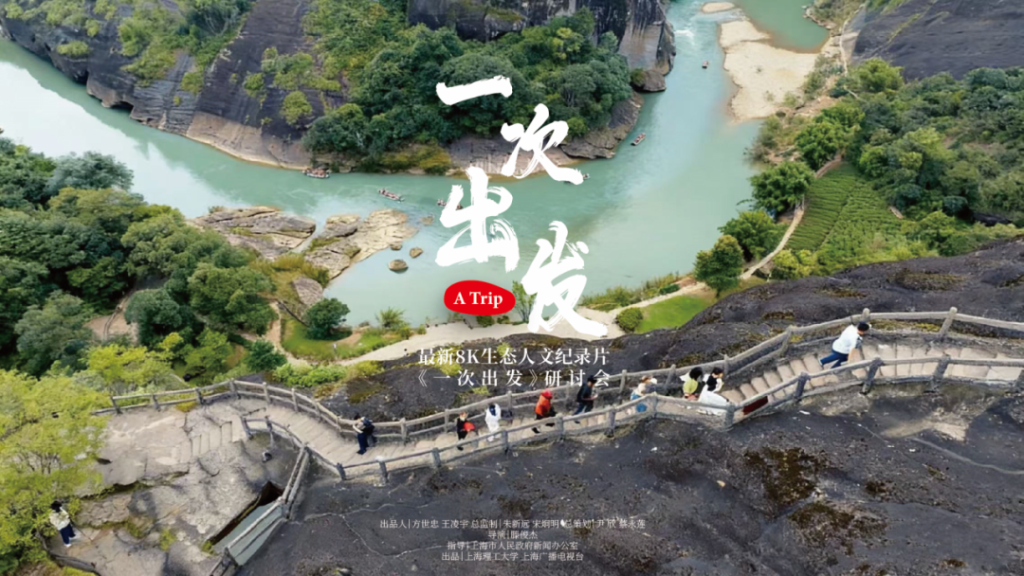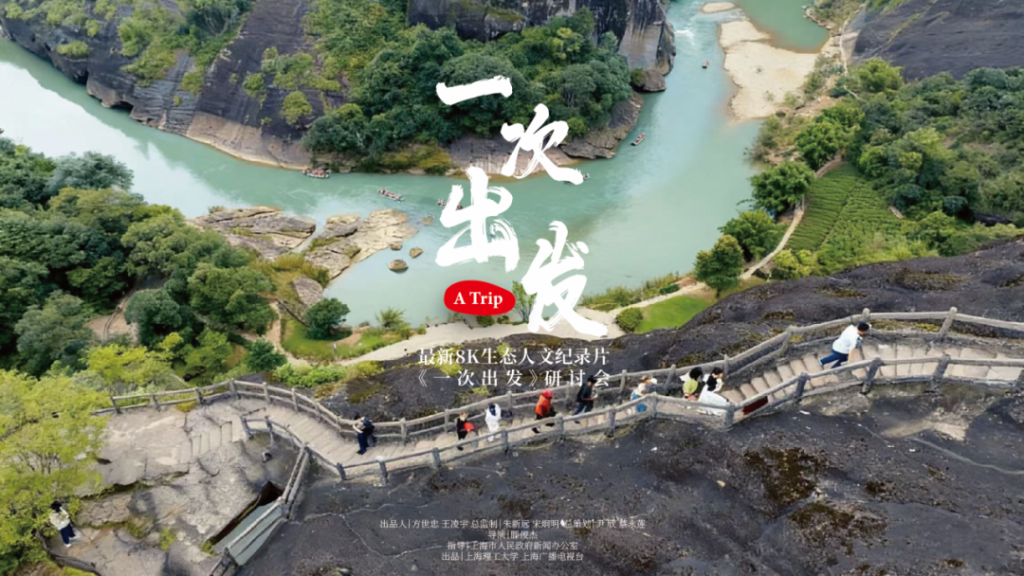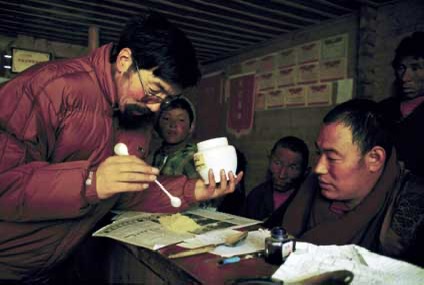

In April 2005, just eight months after the road to Rangu Township in Derge County, Ganzi Prefecture, Sichuan Province was opened, herders flocked to the clinic to see Dr. Zhanma. Some even came from Yushu, Qinghai, more than 400 kilometers away, which takes more than eight hours to drive. The number of patients increased several times compared to before.
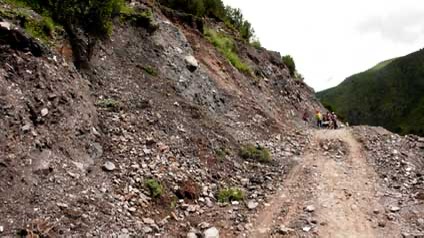
The 13km access road into Rangu Township is a serious landslide area during the rainy season.
Previously, four herdsmen from Shiquchang Sagongma rode along the Yalong River for three days to arrive, bringing a total of 39 bottles of patients' urine (urine samples are one of the diagnostic methods of Tibetan medicine) and more than 60 paper bags for prescriptions. They stayed in the health center for half a month before all the medicines were dispensed.
"Doctor Zhanma wrapped the powdered medicine in old newspapers. He had a habit of drawing symbols on the medicine bag. The sun represented daytime medication, the moon represented nighttime medication, the frowning man represented headache medication, and three circles meant taking more medicine, so that illiterate villagers could understand. Zhuqing Lama Cairan drove out on a motorcycle early in the morning, spending more than seven hours on the journey, with mud on his trouser legs. His younger brother had suffered from liver enlargement for four years, and had spent tens of thousands of yuan in Chengdu without recovery. Doctor Zhanma prescribed Tibetan medicine for four yuan, and the patient was able to get out of bed after twenty days..."
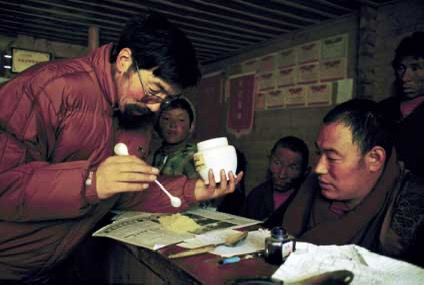
Zhuqing Lama Cairang (first from right) came to see Dr. Zhanma (first from left) to get medicine for his younger brother
Yu Mengting closed his eyes and thought for a while, then told the reporter from The Paper, "Yes, I have been following him for almost 20 years, ever since I took the photo. Times have changed dramatically... but Dr. Zhanma's original intention has not changed."
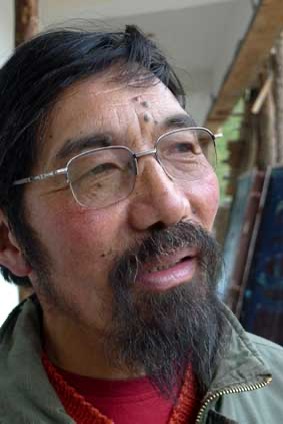
Dr. Jama
Documentary director Yu Mengting always approaches characters with a questioning and objective observation perspective. Before she was commissioned by Southern Weekend to explore the Tibetan medicine topic in 2005, she had been a special correspondent for Hong Kong's "China Travel" and "Traveler", filming the western Sichuan plateau all year round.
When she first met Dr. Zhanma, she was full of doubts.
“Can a medicine worth one or two yuan cure an illness?”
Until one time, she suddenly fell ill while filming in Tibet. Her face was swollen and painful. She was ready to go back home to Chengdu for medical treatment. Doctor Zhanma handed her a fingernail of powder and said, "It may not work, you can try it." Yu Mengting took it half-believingly. She recalled: "When I took it, my tongue was numb. After two hours, my hot face began to return to normal body temperature and the swelling gradually subsided."
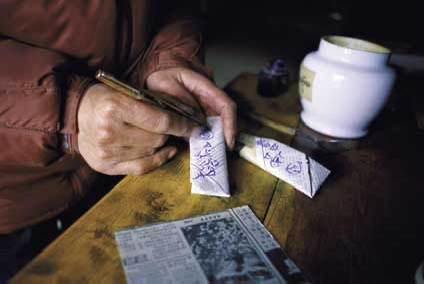
Doctor Zhanma drew various symbols on the outside of the medicine bag so that illiterate villagers could understand it.
As a documentary director, producer, and video artist, Yu Mengting's documentary works cover a wide range, and those involving ethnic themes are particularly eye-catching, such as "37 Years of Temporary Workers", "Summer of 20 Years Old", "Leilei's Troubles", "Gebu Village", etc. "Green Great Wall" won the Jury Award in the "Social Concern Category" of the 13th Asian Television Awards in 2008. She is also a specially appointed tutor at the School of Literature and Journalism of Sichuan University and a selector of the documentary unit of the "Magnolia Award" of the Shanghai TV Festival.
Yu Mengting used to be a judo athlete. She has a strong body, dark skin, and big eyes. Because she shoots at high altitudes for a long time, her cheeks also show "highland red". Strangers may mistakenly think she is Tibetan. In fact, she is a native Shanghainese and graduated from the School of Photography of Beijing Film Academy.
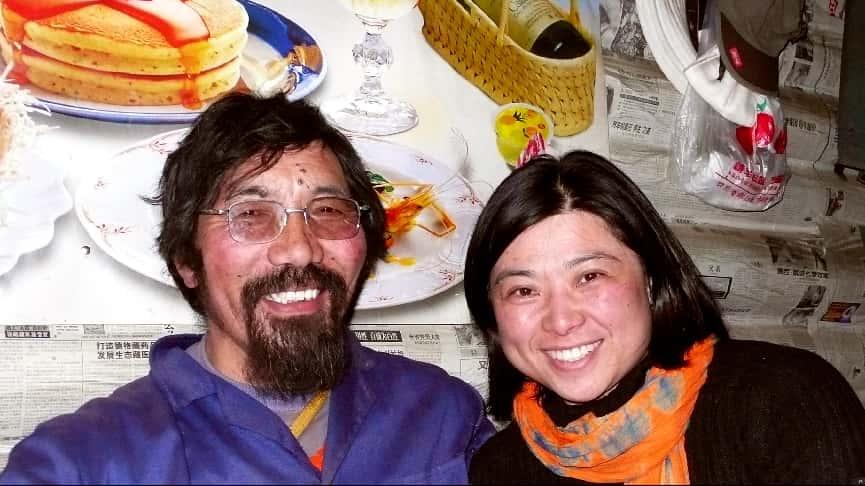
Dr. Jamar and Yu Mengting
The camera satisfies her curiosity to explore the world. In her lens, no matter whether it is Tibetans, Oroqen people or Yi people, there is always an unspeakable spiritual power, and she can always capture the warm and moving qualities of human nature.
She said that for her as a foreigner, photographing ethnic minority subjects is about finding a commonality.
"I prefer what I discover myself. There is a gap between the observations of men and women, and the angles are different. Maybe female directors prefer to focus on the emotions hidden in it, which is more delicate."
But she is not a particularly sentimental person. In order to verify the real data, during the first shoot, Yu Mengting simply lived in a clinic. The local conditions were very difficult. She ate the same food as the locals and could not take a shower for ten days or half a month, just to observe the subject up close.
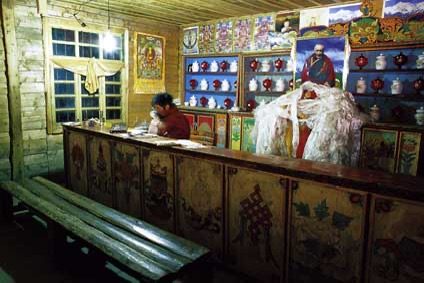
It was already nine o'clock in the evening when the last patient left the clinic. Dr. Zhanma began to record the day's medical records.
In such a remote and small clinic, an average of 120 patients are consulted every day, far exceeding the number of patients in the local county hospital. She even found that many herders would get medicine for acquaintances in other settlements along the way. Paper bags were often piled up in the small clinic, and some herders would bring rare herbs found in the mountains to the clinic. She recorded this harmonious and symbiotic doctor-patient relationship one by one.
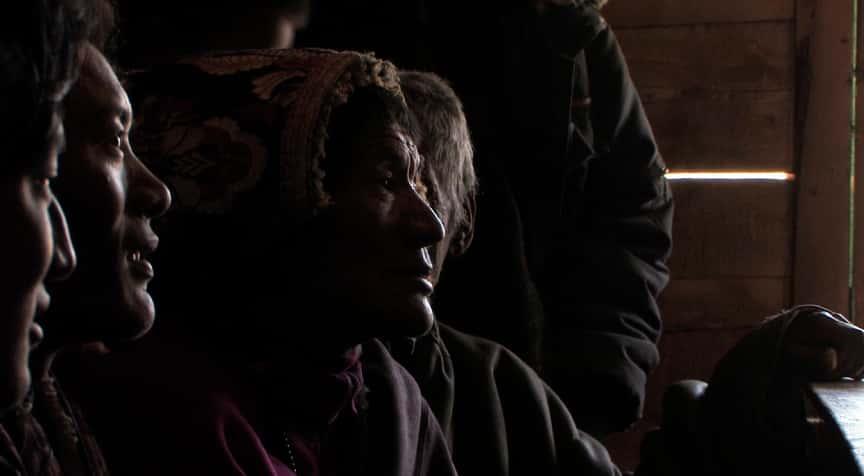
Patients in the old clinic
During the interview, Yu Mengting talked about two things that still impressed her.
Every time Dr. Zhanma went to Derge County for a meeting or to do business, he would ask for old newspapers from various units. Everyone would tacitly save the newspapers for him, because there was no packaging cost for wrapping medicine in newspapers, and the name of the person could be written on it. If the person did not come next time, he could ask someone else to bring the medicine. Dr. Zhanma also tried to use plastic bags to pack medicine, but the herders gave very bad feedback. Ordinary plastic bags are easy to wear out, and the medicine powder would leak out when riding back and forth for hundreds of kilometers. In the end, Dr. Zhanma decided to continue the old tradition of wrapping medicine in newspapers, which is both durable and will not increase the cost of medicine. Dr. Zhanma has never charged for outpatient services, only medicine fees. The cost of ordinary medicines is basically maintained at a few yuan, and the lonely elderly and patients with financial difficulties nearby are also exempted from all charges.
In July 2004, the county health bureau assigned a Western medicine doctor, Zhaxi Saburo, to Ran Gu for the first time. Dr. Zhanma was not averse to Western medicine and would consult Zhaxi Saburo from time to time.
Many years have passed, and Dr. Zhanma is still a "temporary worker." A county in Qinghai offered him a job with a high salary and the position of director of a Tibetan hospital, but he refused: "If I leave, what will happen to the local people?"
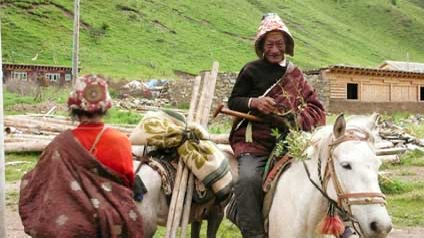
The old man slept in the open and rode for three days to come to the clinic for treatment.
In November 2007, Yu Mengting began to film Dr. Zhanma for the first time. She remembers that on the first night she arrived, someone from the nursing home next door knocked on the door and said that the seriously ill old lady was dying and asked the doctor to go and see her. "The scene and atmosphere are still unforgettable," and she was particularly moved.
"There was no electricity in Rangu at that time, so Dr. Zhanma turned on a flashlight and went in. The light of the flashlight shone on the old woman, and her pale and wrinkled face was groaning in pain. Dr. Zhanma gently pressed his hands on the old woman's forehead, and the old woman's groans gradually became lighter and calmer."
Yu Mengting recorded the scene with a camera. She said: "That moment was very sacred. Zhanma was no longer a doctor's duty, but more like a spiritual duty like a living Buddha. Hospice care has become divine."
In the director's lens, Dr. Zhanma's daily routine starts at five in the morning: burning firewood to boil water, kneading tsampa, and patients crowding the kitchen. Late at night, he prepares medicine under solar lights... The herders call him "Laji", which was a respectful title for doctors during the Songtsen Gampo period.
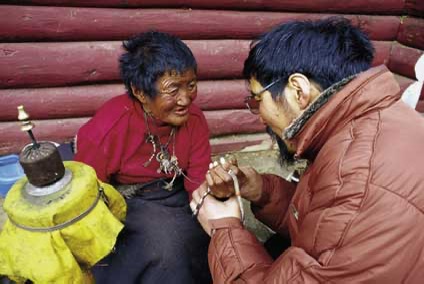
Doctor Zhanma visits seriously ill elderly people in nursing home
In 2009, the county health bureau decided to demolish Dr. Zhanma's old wooden clinic and build a two-story cement building on the site. The ultrasound machine provided by the county health bureau was left idle because there was no electricity or room. When Yu Mengting went there again in 2011, the hospital already had a special ultrasound room for examinations, and the ultrasound machine was powered by a diesel generator.
Speaking of inheritance, Yu Mengting was very emotional. Doctor Zhanma had five or six apprentices. Some could not endure hardship, some were too lazy, and some left because of marriage or job transfer. The only one Zhanma affirmed was Zhaxi Saburo: "He has good Western medicine skills and is willing to endure hardships." Zhaxi Saburo later became their dean, and was not transferred to another district health center as dean until March this year.
In 2017, Dr. Zhanma accepted Qu Zhao as his last disciple. He was very satisfied with Qu Zhao's character, knowledge and work, and Dr. Zhanma's mantle was finally passed on.
In 2013, Yu Mengting returned to Rangu. The new highway was completed and the health center had electricity, but the 13-kilometer road to the village was still bumpy. She asked the old doctor what his wish was, and the answer was the same as in 2005.
"Build the bridge and save patients from suffering."
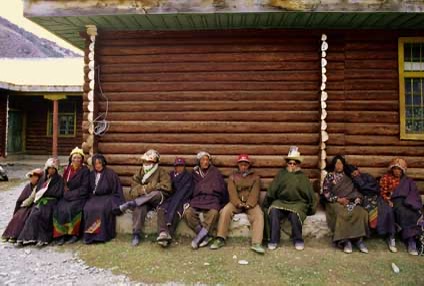
The old clinic was overcrowded, and those who came later could only sit outside the hospital and wait patiently.
In front of the medicine cabinet, a photo of Dr. Zhanma’s mentor, Thubten Khenpo, was buried under a khata, and the symbols of the sun and the moon were still drawn on the newspaper.
【 dialogue】
The Paper: The final presentation of the documentary is still the director’s subjective lens. How do you portray such a selfless and highly respected folk doctor?
Yu Mengting: I focused on exploring Dr. Zhanma’s own emotional world and his emotional connection with the local people.
First, Dr. Zhanma’s personal hobbies and living habits; he likes to collect local maps. He doesn’t know Chinese characters, but he can understand and study maps from all ages; he knows the distribution and picking of Tibetan herbs in the local valley. This shows that he likes to study, so he gradually mastered the rich local Tibetan medicine knowledge. It further shows that "folk doctors" are highly personalized, rather than medical students trained in medical schools with standardized abilities. Their achievements are closely related to individual personality and behavior patterns.
Second, Dr. Zhanma, relying on the prestige he has accumulated through his medical practice, can resolve disputes that the local village head and secretary cannot resolve. This shows that in Tibetan folk society, "prestige" is not entirely conferred by administrative positions, and the role of coordinating public events can also be performed by people with professional skills.
Third, with my "female" identity, I was able to discuss topics about the doctor's "private life" without offending him. For example, I asked him in front of the camera why he didn't get married, whether he had a girlfriend, etc. I tried to create a real and multifaceted Tibetan doctor, Zhanma Ciren, by portraying his private space.
The Paper: Do you remember your first experience with Tibetan medicine?
Yu Mengting: The first time I really came into contact with Tibetan medicine was in 2002. When I went to Gengqing Town, Derge, I suffered from severe back pain and diarrhea. My friend suggested that I go to the local Tibetan doctor for treatment. In the old Tibetan house behind the Derge Sutra Printing House, Dr. Cicheng Jiangcuo checked my urine, felt my pulse, and prescribed seven days of Tibetan medicine. One of the Tibetan pills was calculated based on my zodiac sign to find the best time to take it: it must be swallowed in the dark before the sun rises on Wednesday morning. With a try-it attitude, I followed the Tibetan doctor's instructions and did it honestly. On the fourth day, the diarrhea was cured, and on the seventh day, the back pain completely disappeared. After that experience, I became fascinated with Tibetan medicine.
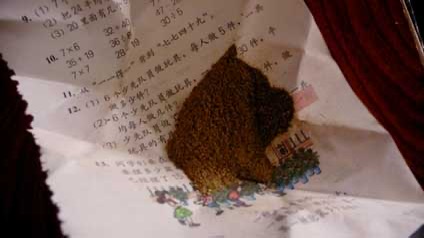
Tibetan medicine prepared by Dr. Zhanma for the director
The Paper: When did you first arrive in Derge?
Yu Mengting: I went to Derge Ashu Grassland by chance in 1999. It was very new and curious to me, so I took a lot of photos at that time. Later, I found that taking photos every year could not satisfy my needs, so I thought of using a documentary to tell their stories.
I go to the Axu Grassland every year and take the same photos of the same people. I think it is very interesting to see many children grow up. Staying in Shanghai for a long time will make people yearn for a free and vast place. On the grassland, I learned to smile, and I also received help from more people, which made me feel the warmth of home. I like national culture very much, and I hope to express it through images. The simple shining points of each subject touched me.
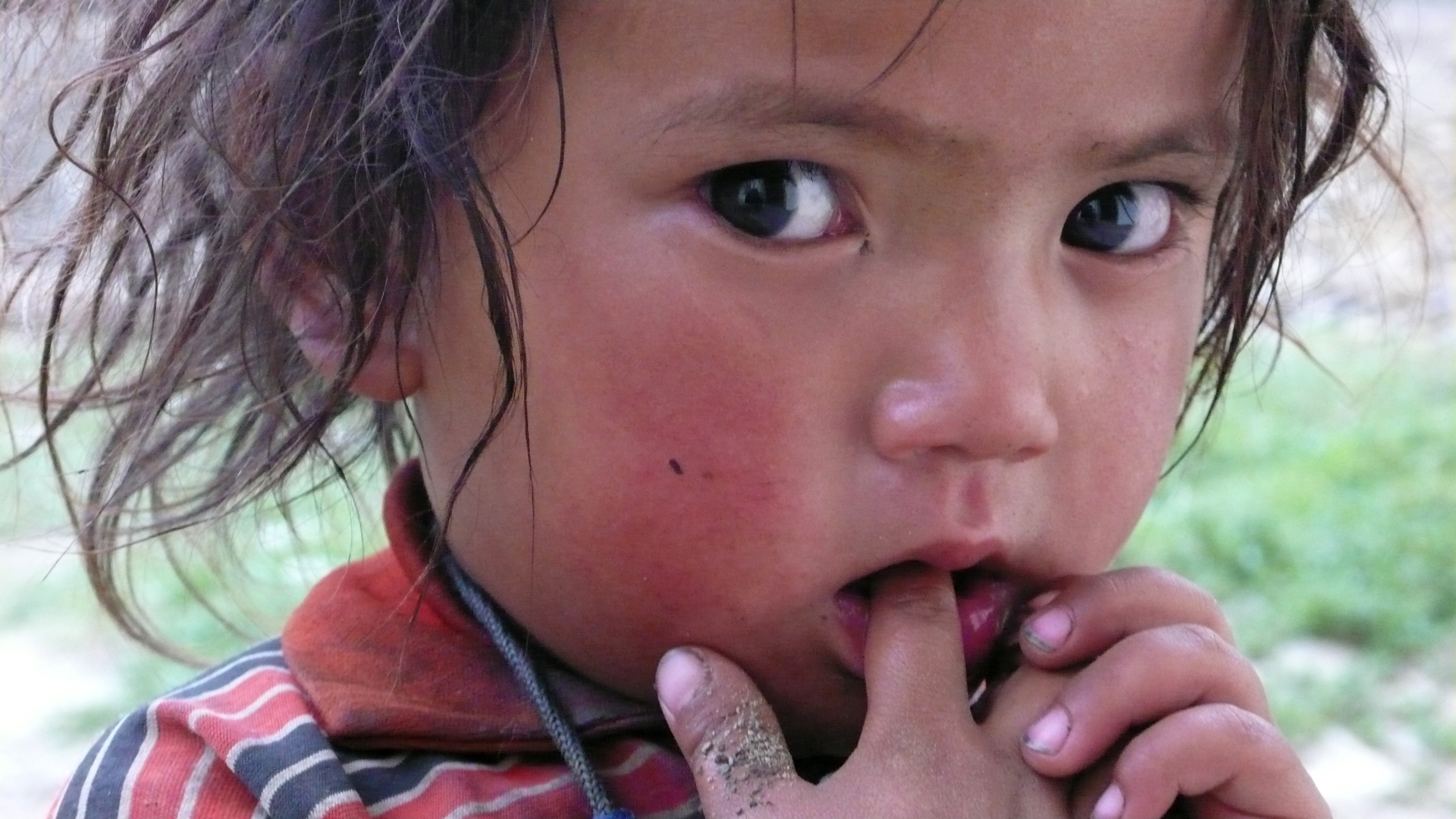
"The local child should be a junior high school student now."
In 2005, Southern Weekend asked me to write an article, and I submitted a topic called "Southern Tibetan Medicine". They thought it was very good, so I went to Derge. It happened that Derge was holding a county Tibetan medicine conference at that time. I selected three Tibetan doctors. The first one was Dr. Luore Pencuo from Meisu Zongsar Monastery. I called him Abba Luore. I lived in his home for more than half a month. During the day, I watched how he treated patients in the clinic. At night, I sat by the fire with him and his family to ask and learn about Tibetan medicine. The second one was Baiya Manba, who was also very famous in the local area. He was the director of Baiyu Tibetan Hospital before he retired and returned to his hometown village to treat patients. The third one was Dr. Zhanma.
The Paper: Why was the protagonist chosen?
Yu Mengting: Dr. Zhanma has been working hard for decades and has become a legend in the local area. In 2005, the then county party secretary Gong Jianzhong strongly recommended Dr. Zhanma to me. At that time, the road to Rangu Township had just been built, and bridges were being built over the nearby Yalong River. There was no electricity at the time. I thought the secretary was doing it for publicity purposes, so I set out on the road to Rangu for the first time with a questioning and curious attitude.
I have been following Dr. Zhanma for nearly 20 years. I remember that when I first went there, Dr. Zhanma's clinic was already covered with many honors and awards awarded by the health system, including the national title of "Excellent Rural Doctor". After Dr. Zhanma was named "China's Most Beautiful Rural Doctor" by CCTV in 2016, he began to receive more social attention.

Dr. Zhanma is known as the "most beautiful doctor"

In 2021, Zhanma was named the 7th Sichuan Provincial Moral Model. Image source: Sichuan News
The Paper: There are many types of Tibetan medicine, why does Dr. Zhanma attract you the most?
Yu Mengting: I am really curious, why his clinic is so small and remote, but there are more people coming to see the doctor than the county hospital. I think all of this is a new knowledge system for me. In this process, I need to distinguish the true from the false. Because Tibetans have many myths and stories, we need to use rational and scientific things to compare them and make judgments.
From a photographic perspective, the Kham people are very beautiful, and I would have preferred to choose someone who is better looking and more photogenic. But after so many years of photographing, appearance is no longer important. What is more important is his medical ethics, compassion, and the recognition of others.
I didn't know this before, but later I learned that in the valley of his township clinic, almost all the grass is Tibetan medicinal materials, which is a big medicine storehouse. Doctor Zhanma usually chooses to pick them when they are in bloom, and the medicinal effect will be particularly good.
His Tibetan medicine is very cheap, and he doesn't charge money for the elderly or people with family difficulties, so everyone respects him. Whenever there are herbs to be picked near a village, the village will organize a meeting for the villagers to help pick the medicine in what shape and what the requirements are. I filmed it and it was very interesting. Everyone volunteered to help him pick the herbs and then sent them to his clinic. His medical ethics and the local community have formed a symbiotic relationship, which moved me very much. Although there are many patients every day, from morning to night, there is no time to drink water or eat, but he has been doing it for decades without any slackness.
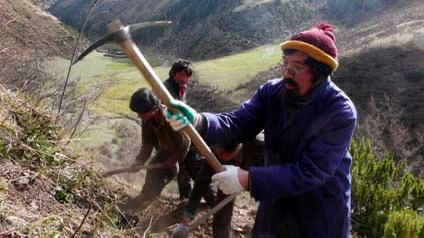
A fellow villager discovered the Tibetan medicine "Jiexi" for treating stomach problems in the mountains. The doctor went up the mountain to confirm the excavation.
The Paper: How is he doing now?
Yu Mengting: He recently appeared on a popular program "Chatting with the Tibetans" on Kangba Tibetan TV. In the program, Dr. Zhanma reviewed his 49 years of medical experience and insights. When the host asked: What is the biggest insight you have gained from being a doctor for so many years? Dr. Zhanma said that practicing the "Four Medical Classics" is a spiritual baptism! This July is the 50th anniversary of Dr. Zhanma's medical career. I will go back to record this precious moment. I wish the old man a long life. His existence is our greatest blessing!
The Paper: When do you think the film will end? What was the biggest difficulty you encountered during the filming?
Yu Mengting: I think the deadline for filming should be in July this year. The biggest difficulty I encountered was actually the subtitle translation of the material. I hope to translate every sentence more accurately and not miss any wonderful narration and material.
The Paper: What do you think has kept him going for fifty years?
Yu Mengting: Although Dr. Zhanma did not become a lama, he has always followed the monks' rules and regulations, such as not smoking or drinking, eating vegetarian food, not killing animals, and not getting married. His ancestors moved from Qinghai and Shiqu to settle in Derge Rangu, and the blood of heroes runs in his family. In this saintly and pious doctor, I see the most simple and authentic spirit of the Tibetan people. At the same time, I also believe that the ultimate source of power for the development and spread of southern Tibetan medicine is still stored in this spirit.
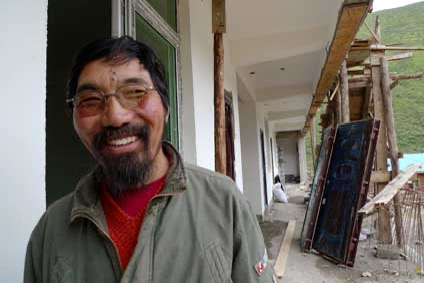
Dr. Chanma's dream of building a large hospital in Rangu has come true
